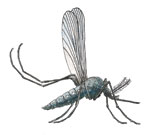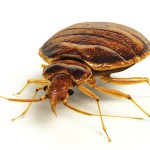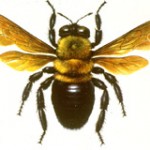READY TO GET STARTED?
REQUEST A FREE ESTIMATE
Fill out the form below or call (888) 466-7849 for a free, no-obligation estimate.
Spring is here and so are the pests. We’ve talked a lot about the unusually warm weather leading to higher numbers of pest sightings and our Ask the Mouse section on our website has been a great place for readers to ask questions about pests they are seeing. Mosquitoes, bed bugs, and carpenter bees are among some of the common household pests that are being seen this spring. Take a look below at some of our most common recent questions.
Why do mosquitoes bite some people more than others?
 Mosquitoes are attracted to carbon dioxide and can sense it from up to 30 yards away. Researchers are still trying to find out exactly what it is that makes some people more attractive than others. Research has indicated that the amount of carbon dioxide in the breath, pregnancy, body temperature, alcohol and odorant markers based on blood type are the top attractants. Pregnant women are preferable because they exhale more carbon dioxide and tend to run a little warmer than the average person. It is also thought that alcohol increases body heat making a person more appealing. So be careful who you hang around at the next cook out.
Mosquitoes are attracted to carbon dioxide and can sense it from up to 30 yards away. Researchers are still trying to find out exactly what it is that makes some people more attractive than others. Research has indicated that the amount of carbon dioxide in the breath, pregnancy, body temperature, alcohol and odorant markers based on blood type are the top attractants. Pregnant women are preferable because they exhale more carbon dioxide and tend to run a little warmer than the average person. It is also thought that alcohol increases body heat making a person more appealing. So be careful who you hang around at the next cook out.
My son’s coming home from college. What do I need to do to make sure he doesn’t bring home bed bugs?
 Bed bugs are evasive and hard to detect. When your son brings home his clothes, make sure to leave them outside, in a detached building or in the garage. Immediately place the dirty clothes in the washing machine and dry them on high for at least 10 minutes. It is best to keep the luggage out of the house if possible. If you don’t have that option you can place the luggage in black plastic bags and leave them outside in the sun on a hot day. You can also do this with furniture. Bed bugs won’t tolerate temperatures greater than 120 degrees. Since bed bugs are tiny and can get into the smallest cracks, it is best to have a professional to inspect furniture and other items before you bring them into your house.
Bed bugs are evasive and hard to detect. When your son brings home his clothes, make sure to leave them outside, in a detached building or in the garage. Immediately place the dirty clothes in the washing machine and dry them on high for at least 10 minutes. It is best to keep the luggage out of the house if possible. If you don’t have that option you can place the luggage in black plastic bags and leave them outside in the sun on a hot day. You can also do this with furniture. Bed bugs won’t tolerate temperatures greater than 120 degrees. Since bed bugs are tiny and can get into the smallest cracks, it is best to have a professional to inspect furniture and other items before you bring them into your house.
I found sawdust on my back porch. Does that mean I have termites?
 Termites eat the cellulose part of the wood and don’t leave behind sawdust. Chances are you have a different pest, one of the most common is the carpenter bees. Carpenter bees get their name because they excavate clean round entrance holes, close to ½ inch wide, into soft wood such as pine, cedar, cypress and fir. The prefer to attack structural timbers and other wood products such as fascia boards, porch ceilings, decks, railings, siding, shutters, firewood, and other weathered wood. They tend to avoid wood that is well painted or covered in bark. They do not eat the wood therefore they leave behind the sawdust. They bore into wood to make galleries for nesting. If left untreated, they can cause extensive damage.
Termites eat the cellulose part of the wood and don’t leave behind sawdust. Chances are you have a different pest, one of the most common is the carpenter bees. Carpenter bees get their name because they excavate clean round entrance holes, close to ½ inch wide, into soft wood such as pine, cedar, cypress and fir. The prefer to attack structural timbers and other wood products such as fascia boards, porch ceilings, decks, railings, siding, shutters, firewood, and other weathered wood. They tend to avoid wood that is well painted or covered in bark. They do not eat the wood therefore they leave behind the sawdust. They bore into wood to make galleries for nesting. If left untreated, they can cause extensive damage.
What other questions do you have for Northwest Exterminating’s Ask The Mouse section?
Have you seen mosquitoes, bed bugs, carpenter bees, or other pests in or around your home?
Disclaimer: These tips are general medical information and do not constitute medical advice. Please contact your physician for information about yourself or your family member.
Spring has arrived and brought pollen with it. Yesterday’s pollen count is the highest ever recorded in Atlanta for that date. According to Atlanta Allergy and Asthma Clinic, the record number was 9369 per cubic meter.
If you have springtime allergies you are probably having a tough time right now due to the extremely high pollen counts. Even people who do not normally have allergies can be having some difficulties with the pollen.
Symptoms include:
Tips To Avoid Pollen:
Treatment for Hay Fever Symptoms:
If you have a cough, wheezing or difficulty breathing, immediately call your doctor. For serious breathing problems call 911. You may be having a serious problem like an asthma attack. Treatment may include breathing treatments or steroids. You will definitely need to see your doctor if you are concerned about your cough or breathing.
In general, anti-histamines (like diphenhydramine, loratadine, cetirizine, and fexofenadine) are the first thing many people try because they decrease the allergic response. There are multiple over the counter preparations that work pretty well, but oftentimes one works better for one individual than another, and some have less side effects, like sedation, than others. There are prescription medications as well that your doctor can prescribe to you.
Decongestants help by relieving the inflammation and congestion that comes with the allergic response. Medications like pseudoephedrine and phenylephrine are available over the counter but can have serious side effects, so talk to your doctor or pharmacist before you begin taking them.
Steroids also decrease the inflammation related to allergies so they are used commonly if the anti-histamine or decongestants are not effective. Steroids are always prescribed by a physician or health care provider and cannot be obtained over the counter.
For itchy eyes (Allergic Conjunctivitis) there are many types of over the counter drops that work very well. One product has pheneramine (anti-histamine) and naphazoline (gets the red out). As with any medicine it can have side effects so contact your doctor if you are taking any other medications before you use it. Please discuss the treatment with your physician if you have any concerns.
Sneezing, runny nose, and congestion are symptoms of Allergic Rhinitis. There are many different preparations for this as well starting with decongestants which dry up your nose. Other preparations are steroid nasal sprays and medicines that stabilize the allergic response.
Enjoy Spring, but be careful if you are having allergic symptoms and call your doctor for any medical advice. CorrectMed Pediatrics can answer your questions and treat you if needed.
Thanks,
Dr. Goo